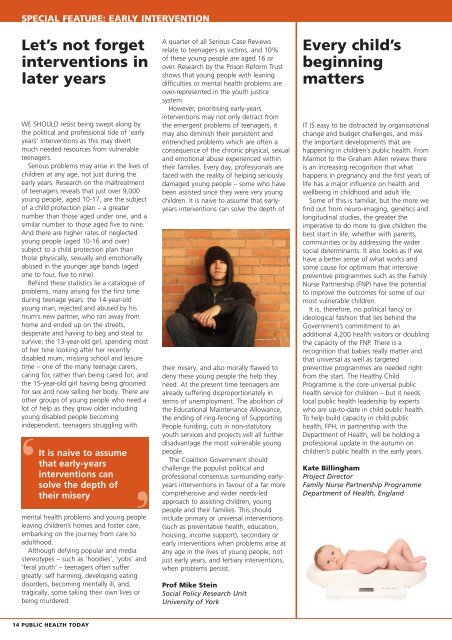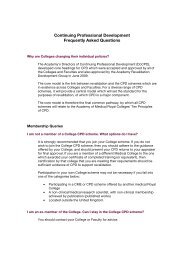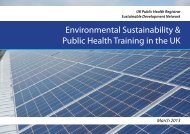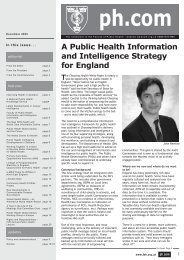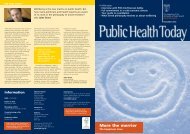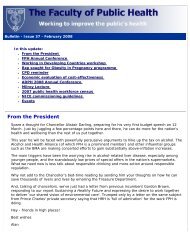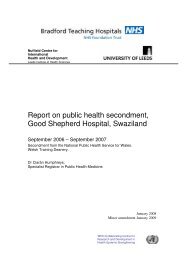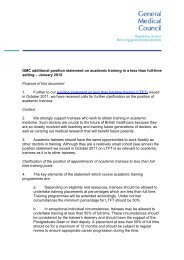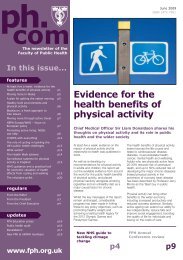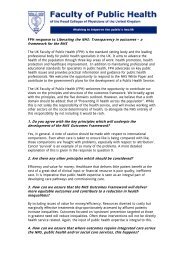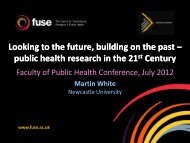PHT June 2011_Jan 10 - UK Faculty of Public Health
PHT June 2011_Jan 10 - UK Faculty of Public Health
PHT June 2011_Jan 10 - UK Faculty of Public Health
You also want an ePaper? Increase the reach of your titles
YUMPU automatically turns print PDFs into web optimized ePapers that Google loves.
SPECIAL FEATURE: EARLY INTERVENTION<br />
Let’s not forget<br />
interventions in<br />
later years<br />
WE SHOULD resist being swept along by<br />
the political and pr<strong>of</strong>essional tide <strong>of</strong> ‘early<br />
years’ interventions as this may divert<br />
much needed resources from vulnerable<br />
teenagers.<br />
Serious problems may arise in the lives <strong>of</strong><br />
children at any age, not just during the<br />
early years. Research on the maltreatment<br />
<strong>of</strong> teenagers reveals that just over 9,000<br />
young people, aged <strong>10</strong>-17, are the subject<br />
<strong>of</strong> a child protection plan – a greater<br />
number than those aged under one, and a<br />
similar number to those aged five to nine.<br />
And there are higher rates <strong>of</strong> neglected<br />
young people (aged <strong>10</strong>-16 and over)<br />
subject to a child protection plan than<br />
those physically, sexually and emotionally<br />
abused in the younger age bands (aged<br />
one to four, five to nine).<br />
Behind these statistics lie a catalogue <strong>of</strong><br />
problems, many arising for the first time<br />
during teenage years: the 14-year-old<br />
young man, rejected and abused by his<br />
mum’s new partner, who ran away from<br />
home and ended up on the streets,<br />
desperate and having to beg and steal to<br />
survive; the 13-year-old girl, spending most<br />
<strong>of</strong> her time looking after her recently<br />
disabled mum, missing school and leisure<br />
time – one <strong>of</strong> the many teenage carers,<br />
caring for, rather than being cared for; and<br />
the 15-year-old girl having being groomed<br />
for sex and now selling her body. There are<br />
other groups <strong>of</strong> young people who need a<br />
lot <strong>of</strong> help as they grow older including<br />
young disabled people becoming<br />
independent, teenagers struggling with<br />
It is naive to assume<br />
that early-years<br />
interventions can<br />
solve the depth <strong>of</strong><br />
‘their misery<br />
‘<br />
mental health problems and young people<br />
leaving children’s homes and foster care,<br />
embarking on the journey from care to<br />
adulthood.<br />
Although defying popular and media<br />
stereotypes – such as ‘hoodies’, ‘yobs’ and<br />
‘feral youth’ – teenagers <strong>of</strong>ten suffer<br />
greatly: self harming, developing eating<br />
disorders, becoming mentally ill, and,<br />
tragically, some taking their own lives or<br />
being murdered.<br />
A quarter <strong>of</strong> all Serious Case Reviews<br />
relate to teenagers as victims, and <strong>10</strong>%<br />
<strong>of</strong> these young people are aged 16 or<br />
over. Research by the Prison Reform Trust<br />
shows that young people with leaning<br />
difficulties or mental health problems are<br />
over-represented in the youth justice<br />
system.<br />
However, prioritising early-years<br />
interventions may not only detract from<br />
the emergent problems <strong>of</strong> teenagers, it<br />
may also diminish their persistent and<br />
entrenched problems which are <strong>of</strong>ten a<br />
consequence <strong>of</strong> the chronic physical, sexual<br />
and emotional abuse experienced within<br />
their families. Every day, pr<strong>of</strong>essionals are<br />
faced with the reality <strong>of</strong> helping seriously<br />
damaged young people – some who have<br />
been assisted since they were very young<br />
children. It is naive to assume that earlyyears<br />
interventions can solve the depth <strong>of</strong><br />
their misery, and also morally flawed to<br />
deny these young people the help they<br />
need. At the present time teenagers are<br />
already suffering disproportionately in<br />
terms <strong>of</strong> unemployment. The abolition <strong>of</strong><br />
the Educational Maintenance Allowance,<br />
the ending <strong>of</strong> ring-fencing <strong>of</strong> Supporting<br />
People funding, cuts in non-statutory<br />
youth services and projects will all further<br />
disadvantage the most vulnerable young<br />
people.<br />
The Coalition Government should<br />
challenge the populist political and<br />
pr<strong>of</strong>essional consensus surrounding earlyyears<br />
interventions in favour <strong>of</strong> a far more<br />
comprehensive and wider needs-led<br />
approach to assisting children, young<br />
people and their families. This should<br />
include primary or universal interventions<br />
(such as preventative health, education,<br />
housing, income support), secondary or<br />
early interventions when problems arise at<br />
any age in the lives <strong>of</strong> young people, not<br />
just early years, and tertiary interventions,<br />
when problems persist.<br />
Pr<strong>of</strong> Mike Stein<br />
Social Policy Research Unit<br />
University <strong>of</strong> York<br />
Every child’s<br />
beginning<br />
matters<br />
IT IS easy to be distracted by organisational<br />
change and budget challenges, and miss<br />
the important developments that are<br />
happening in children’s public health. From<br />
Marmot to the Graham Allen review there<br />
is an increasing recognition that what<br />
happens in pregnancy and the first years <strong>of</strong><br />
life has a major influence on health and<br />
wellbeing in childhood and adult life.<br />
Some <strong>of</strong> this is familiar, but the more we<br />
find out from neuro-imaging, genetics and<br />
longitudinal studies, the greater the<br />
imperative to do more to give children the<br />
best start in life, whether with parents,<br />
communities or by addressing the wider<br />
social determinants. It also looks as if we<br />
have a better sense <strong>of</strong> what works and<br />
some cause for optimism that intensive<br />
preventive programmes such as the Family<br />
Nurse Partnership (FNP) have the potential<br />
to improve the outcomes for some <strong>of</strong> our<br />
most vulnerable children.<br />
It is, therefore, no political fancy or<br />
ideological fashion that lies behind the<br />
Government’s commitment to an<br />
additional 4,200 health visitors or doubling<br />
the capacity <strong>of</strong> the FNP. There is a<br />
recognition that babies really matter and<br />
that universal as well as targeted<br />
preventive programmes are needed right<br />
from the start. The <strong>Health</strong>y Child<br />
Programme is the core universal public<br />
health service for children – but it needs<br />
local public health leadership by experts<br />
who are up-to-date in child public health.<br />
To help build capacity in child public<br />
health, FPH, in partnership with the<br />
Department <strong>of</strong> <strong>Health</strong>, will be holding a<br />
pr<strong>of</strong>essional update in the autumn on<br />
children’s public health in the early years.<br />
Kate Billingham<br />
Project Director<br />
Family Nurse Partnership Programme<br />
Department <strong>of</strong> <strong>Health</strong>, England<br />
14 PUBLIC HEALTH TODAY


